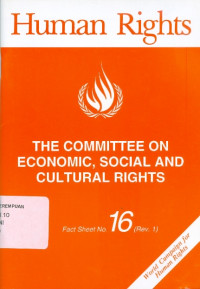
Text
The committee on economic, social and cultural rights fact sheet no. 16 (rev. 1)
Under international human rights law (as well as in terms of its application at the national level), civil and political rights have, in many respects, received more attention, legal codification and judicial interpretation, and have been instilled in public consciousness to a far greater degree, than economic, social and cultural rights. It is therefore sometimes wrongly presumed that only civil and political rights (right to a fair trial, right to equality of treatment, right to life, right to vote, right to be free from discrimination, etc.) can be subject to violation, measures of redress and international legal scrutiny. Economic, social and cultural rights are often viewed as effectively "second-class rights"-unenforceable, non-justiciable, only to be fulfilled "progressively" over time. Such perspectives, however, overlook a postulate of the global human rights system formulated as long ago as 1948 with the adoption of the Universal Declaration of Human Rights, namely, that the indivisibility and interdependence of civil and political rights and economic, social and cultural rights are fundamental tenets of international human rights law. This point of view has been repeatedly reaffirmed, most recently at the World Conference on Human Rights in 1993.(2) Economic, social and cultural rights are fully recognized by the international community and throughout international human rights law. Although these rights have received less attention than civil and political rights, far more serious consideration than ever before is currently being devoted to them. The question is not whether these rights are basic human rights, but rather what entitlements they imply and the legal nature of the obligations of States to realize them. Economic, social and cultural rights are designed to ensure the protection of people as full persons, based on a perspective in which people can enjoy rights, freedoms and social justice simultaneously. In a world where, according to the United Nations Development Programme (UNDP), "a fifth of the developing world's population goes hungry every night, a quarter lacks access to even a basic necessity like safe drinking-water, and a third lives in a state of abject poverty-at such a margin of human existence that words simply fail to describe it(3) the importance of renewed attention and commitment to the full realization of economic, social and cultural rights is self-evident.
Availability
| KP.1 000130 | KP.1 INT c | My Library | Available |
Detail Information
- Series Title
-
World Campaign for Human Rights
- Call Number
-
KP.1 INT C
- Publisher
- Jenewa : United Nations., 2006
- Collation
-
54p. ; 21cm
- Language
-
English
- ISBN/ISSN
-
10145567
- Classification
-
KP.1
- Content Type
-
-
- Media Type
-
-
- Carrier Type
-
-
- Edition
-
-
- Subject(s)
- Specific Detail Info
-
-
- Statement of Responsibility
-
-
Other version/related
No other version available
File Attachment
Comments
You must be logged in to post a comment
 Computer Science, Information & General Works
Computer Science, Information & General Works  Philosophy & Psychology
Philosophy & Psychology  Religion
Religion  Social Sciences
Social Sciences  Language
Language  Pure Science
Pure Science  Applied Sciences
Applied Sciences  Art & Recreation
Art & Recreation  Literature
Literature  History & Geography
History & Geography